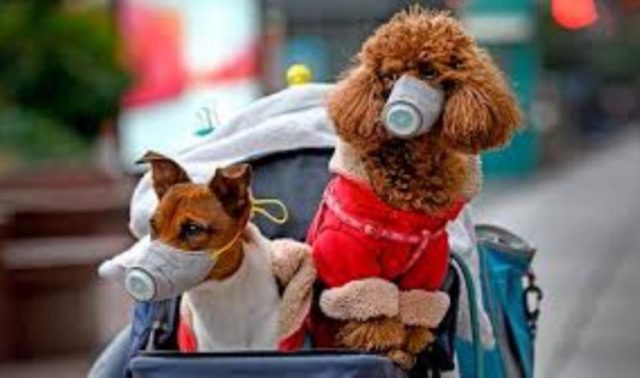In February 2020, a domestic dog in Hong Kong was quarantined for testing “weak positive” to coronavirus. This courted attention to the actual effect of the coronavirus on animals. According to the country’s AFCD (Agriculture, Fisheries, and Conservation Department), they carried out repeated tests, which suggested that the pup had the virus on a “low-level” and that the case may likely be that of human to animal transmission. The victim happens to be a Pomeranian and did not display symptoms associated with the illness. However, the pet’s parent has a confirmed case of COVID-19.
Now, there is an increasing concern among pet adopters that this killer disease can be spread from animals to humans, but the question of whether it is scientifically possible is yet to be answered. Get enlightened about the effect of the coronavirus on animals.
Table of Contents
What is Coronavirus?
Coronavirus belongs to a large group or family of viruses that are capable of engendering a plethora of symptoms such as cough, runny nose, fever, and sore throat. While the severe ones are likely to cause pneumonia, the mild ones can only lead to the common cold. The name of the virus came from the structure of its surface, which has crown-like spikes. (“Corona” is a Latin word meaning “crown”). There are at least three groups of the genus coronavirus, causing mild to serious respiratory, enteric, and systemic diseases.
There are coronaviruses that cause ailment in some animals like camels, cattle, and bat. Feline and canine coronaviruses do not get to humans; they can only infect other animals. It may be rare, but we have seen coronavirus on animals that can also infect people. However, the exact source of COVID-19 outbreak is yet to be established, and there is no evidence that the disease can be spread by household pets. There is also no evidence suggesting that the novel 2019 coronavirus can be contracted from imported animal products or imported animals.
Some Diseases Caused by Coronavirus
MERS (Middle East respiratory syndrome) and SARS (severe acute respiratory syndrome) are good examples of viruses causing diseases that originated from animals and later spread to humans. Experts suspect that this is exactly the case with the recent outbreak of the COVID-19, though the exact source is yet to be established. While relevant authorities are not relenting in identifying where the disease originated from, the global population needs to stay safe.
The initial infections were traced to a Chinese live animal market, but a current trend is a person-to-person infection. Among the coronavirus family, the one that is closely related to the virus that causes COVID-19 is SARS. For now, no evidence supports the spread of COVID-19 from companion animals or that the infection can come from them.
Coronavirus on Animals, Can Humans Contract it From Pets?
Both wild and domestic animals like bats, cattle, camels, dogs, ferrets, cats, and others harbor coronaviruses. It may be rare, but the disease is transmittable from animals to humans. The reservoir hosts are the bats, which are capable of crossing species barriers to get humans and other animals infected, both domestic and wild ones.
In the previous two main coronaviruses that got transmitted to people, the transmissions transpired through intermediary hosts: the dromedary camels (MERS) and masked palm civet (SARS). Investigations are still going on about the new 2019 coronavirus disease tagged COVID-19, though findings are suggesting that the origin is from bats that transmitted it to people via an intermediary animal host.
Do Household Pets Stand a Risk of Getting COVID-19, and Can it be Passed on to Their Owners?
According to WHO, no evidence suggesting that felines and canines can fall sick with COVID-19 exists, and there is equally no evidence that they can infect humans and other animals with the virus. Even after the Hong Kong authorities confirmed a “weak positive” status from the Pomeranian, the dog never displayed any symptoms. They later concluded that the pup probably got the virus from the owner who tested positive earlier. However, they stressed that the public should not be alarmed over the issue.
We should note that some species can live with viruses and not display any symptoms of illness; besides the virus may not be transmissible to others. For now, there is no suggestion that household pets like canines and felines can transmit COVID-19 to human beings.
As far as pragmatic risk factors—if, for example, your pup is frequently at home and has no contact with other outside dogs or humans, and there is no case of COVID-19 in your household, the odds are highly unlikely that your pooch will become infected. For the most part, the effect of the coronavirus on animals is not a major problem for now.
How to Protect Your Pets if You are Sick With Coronavirus
Anybody who is confirmed to be sick with COVID-19 should isolate themselves from household pets in the same way they would from humans. The same measures should be taken even when you only suspect you have the infection. Since we have just limited information about the virus, victims of COVID-19 should stay clear of all animals, even though there are no reports of these household pets and other animals falling sick with the disease. This is to ensure that both pets and parents stay healthy until more facts are revealed about the virus.
If you happen to be the caregiver for your pet, another family member can step in for you for the duration of your sickness. No more feeding, petting, kissing, snuggling, or being licked. If it is compulsory that you must interact with your pet while sick, recommendations indicate that you put on a facemask and wash your hands properly before going close to them; your hands should equally be washed after the interaction.
How is the Coronavirus Spread?
Reports from CDC said that COVID-19 is majorly spread from one person to another, especially when people are within at least six feet of each other.
Another avenue of infection is through respiratory droplets, which emanate when a COVID-19 positive patient sneezes or coughs. Anybody who is close enough to the infected person will have some of these droplets landing on their noses or mouth before it will be inhaled into the victim’s lungs.
When an object or surface has the virus on it, people can easily contract it by mere touch and consequently touching their nose, eyes, or mouth.
Should I Use a Facemask For My Pet When in Public?

Facemasks that are made for animals may be ineffective in the prevention of diseases transmitted via body fluid droplets. The best way to keep your animal family members protected from respiratory diseases is by vaccination. Among the regular vaccines for the prevention of respiratory disease in animals are the shots for parainfluenza, Bordetella, and canine influenza.
Read Also: 14 Natural Antibiotics for Dogs- Are They Effective?
Can Pets be Tested For COVID-19 by Veterinarians
Yes, it is possible and took effect on the 15th of March 2020. The College of Vet Medicine’s Veterinary Diagnostic Laboratory is equipped to test for the COVID-19 in household pets. However, it is only a qualified vet that is allowed to submit a test request to check for coronavirus on animals alongside the rationale for the test. At the vet’s behest, the request goes for approval by the state public health veterinarian and state animal health officer on a case-by-case basis. If the result turns out positive, the requesting vet will be notified after informing government officials.
